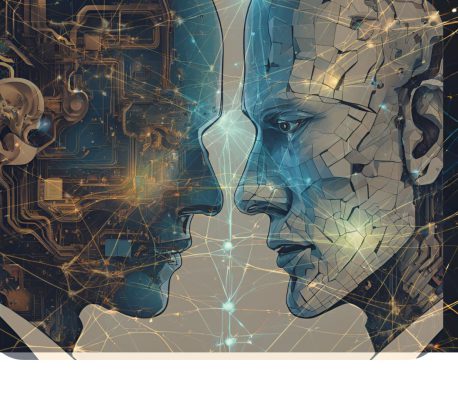Welcome to my concluding blog! As hinted in my earlier post, this blog is to share my thoughts about two YouTube broadcasts, nearly a decade apart, featuring Professor Geoffrey Hinton.The Code That Runs Our Lives(2016) ;‘Godfather of AI’ on AI “exceeding human intelligence” and it “trying to take over”(2024).
I will analyse the key insights from his interviews, focusing on his vision and Artificial Intelligence(AI)’s future impacts concerning communication for development.

Geoffrey Hinton, often referred to as the “Godfather of AI,” has always been very optimistic about how AI can solve some very complex problems and make human life better. According to him, most of his efforts put into AI research were aimed at addressing technical challenges. His primary focus was on addressing issues related to the inefficiency and non-scalability of neural networks. With the growth in AI technology, Hinton’s thoughts and views have become increasingly focused on the risks linked with AI.
Hinton has spoken about the possible risks of AI through the concept of autonomous weapons or AI being used to deceive and manipulate humans. He has been quoted as saying how deeply disturbed he is regarding a scenario where AI intelligence might go beyond human control and intelligence.His arguments have also touched on ethical concerns in the development of AI, especially on job loss and its potential misuse, though these points have not been emphasized prominently.
Interestingly, Hinton is of the view that the elimination of bias is less important than mitigating threats. According to him, bias has been a part of human evolution and will persist in AI also, but the effort should be towards mitigating threats.Additionally,he calls for international co-operation to build consensus on the ethical use of AI, particularly, in military and defense contexts.
Communication for Development in the Age of AI:
Communication for development is an area that is continuously changing with media and technology advancements. Challenges, as in any paradigm shift as elaborated in the “Diffusion of Innovations Theory”, have always been present in production and adoption of AI technology. We live in a time when information and misinformation thrive together, when AI technologies are rapidly evolving, while many people are still at the mercy of basic needs like food security, shelter, and safety. Innovations are important, yet they tend to be perceived as products of capitalism. Capitalism and Innovation
Instead of marginalizing under-privileged populations, it becomes critical to involve them with ethical considerations in the creation of AI through participatory communication. AI can be used as a strong tool in empowering such communities. Several developing nations are already considering AI as an economic opportunity with initiatives such as AI in Africa ,whilst carefully addressing the ethical concerns surrounding it.AI as a Catalyst to Transform Economies in Sub-Saharan Africa.
Whilst,we still don’t have any developed view of how the larger society collectively knows, learns and agrees on the knowledge produced through AI-based science.We Have No Satisfactory Social Epistemology of AI-Based Science Koskinen, Inkeri
This is where the debate really comes in, touching on the role of AI in society.
Join the conversation and share your thoughts below. How do you see AI shaping our future? Is it a tool for empowerment or a catalyst for hegemony?
Featured Image:©[ Image generated via Canva.com]
REFERENCES:
Terborgh, G. W. (1950). Capitalism and Innovation. The American Economic Review, 40(2), 118–123. http://www.jstor.org/stable/1818032
Koskinen, I. (2023). We Have No Satisfactory Social Epistemology of AI-Based Science. Social Epistemology, 38(4), 458–475. https://doi.org/10.1080/02691728.2023.2286253



Hi, Pree 🙂
I really loved how your post captures the complexity of AI. To be honest, AI scares me a bit. There is so much we don’t know about whether it can help us achieve the ‘good’ we hope for. I agree with you that AI can be an essential tool if rightsholders are actively engaged in its ethical creation and use. In India, I’m seeing many media platforms and social organizations, such as the Indian Development Review (IDR) and IT for Change, trying to channel AI’s potential to help women and marginalized communities fight gender inequality, digital divide, and social injustices. In the end, like many other tools and apps, I feel it all comes down to how humanity, especially those in power, chooses to use AI.
Hi Anu,
Thanks for sharing your opinion,I truly appreciate it!I agree with you;the rapid proliferation of AI and implicit hegemony seems dreadful.However,over the decades,we(humans) have strived to tackle many development challenges.In the end, as you mentioned, people in power decide the affordances and functionality of any innovation.Yet,we have the power to urge for policy change ,ethical development and the responsible of AI.Similarly,I believe we need to take collective action to address the challenges posed by AI as they escalate and deepen development crises and disparities.We as students and future ComDev practitioners should keep voicing the concerns on amplification of disparities and hidden hegemony.
//Best regards,
Pree